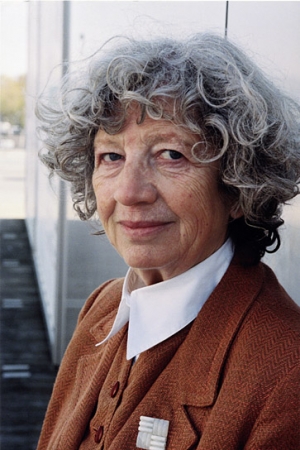Gallery
All Pictures (7)Biography
After an apprenticeship as a bank clerk, Ottinger studied art in Munich from 1959 on. From 1962 to 1968, she worked as a photographer and painter in Paris, where she wrote her first screenplay in 1966. In 1969, she set up Filmclub Visuell together with Filmseminar and served as its head until 1972. In 1973, she finished "Laokoon & Söhne" ("Laocoon & Sons") with Tabea Blumenschein, who participated in all of her films – mainly as leading actress – until 1979. Like in most of her films, Ottinger is listed as director, cinematographer, screenplay writer, producer, and as actress. By means of the props and roles of circus Laokoon, the film deals with the topics of latency of fascism and gender relations, among others. Ottinger's conflicts about the relations of image and sound, the use of quotes, myths, and roles that are set against their truth claim have their origin in "Laokoon & Söhne".
In "Die Betörung der blauen Matrosen" (1975), Ottinger resumed these topics under recourse of the Siren myth. "Madame X – Eine absolute Herrscherin" ("Madame X: An Absolute Ruler", 1978), that was co-produced by ZDF, so that Ottinger was able to reach a larger audience, is a feminist parody of the pirate adventure movie genre and a filmic parody on the women's movement.
In "Bildnis eine Trinkerin" ("Ticket of No Return", 1979), Blumenschein plays a female dandy. In the film, Ottinger parodies the conventional portrayal of women as a spectacle, and alcoholism becomes a metaphor for alienation. Ottinger resumed this subject in "Freak Orlando" (1981) and in "Dorian Gray im Spiegel der Boulevardpresse" ("The Image of Dorian Gray in the Yellow Press", 1984). Thus, the three films nearly became a trilogy about the exclusions and inclusions of the marginalized in modern society. Nearly all objects in these films made an appearance in her short film "Usinimage" (1987).
In her documentary film "China – Die Künste – Der Alltag" (1985), Ottinger again thematized these subjects. Because of the camera's distance and the absence of a commentary, the images and the soundtrack achieve autonomy thus avoiding a voyeuristic perspective on the alien culture. Ottinger continued the elaboration of this non-exoticizing perspective in the 500-minute long "Johanna d'Arc of Mongolia" ("Joan of Arc of Mongolia", 1989, winner of a German film award), and in "Taiga" (1991/92).
In "Exil Shanghai" ("Exile Shanghai", 1997) – a film about Shanghai as sanctuary for Jewish refugees from the parts of Europe that were ruled by the Nazis – the connection between two cultures is shown in the combination of current and historic film footage.
The following years had Ottinger travelling Southeast Europe, where she made a documentary and a fictional feature film: The six-hour travelogue "Südostpassage" (2002) premiered at the Documenta XI and depicts an expedition through Poland, Hungary, the Czech Republic, Bulgaria, Ukraine, Slovakia and Turkey. Shot in Ukraine, the feature film "Zwölf Stühle" ("Twelve Chairs", 2004), based on the 1928 novel by Ilja Ilf and Jewgeni Petrow, premiered at the 2004 Berlin IFF. In 2007, the festival saw the premiere of her next documentary "Prater", an engaging and multi-layered portrait of Vienna's famous amusement park, which was named Best Documentary Feature by the association of German film critics.
Ottinger's 2009 documentary "Die koreanische Hochzeitstruhe" ("The Korean Wedding Chest") explores how archaic family traditions survive in the context of the modern Korean society, while her 2011 feature "Unter Schnee" depicts everyday life in the Japanese province of Echigo. In 2011, Ottinger was recipient of the Hannah-Höch-Preis of the city of Berlin, and in 2012, she herself became the subject of a documentary: "Ulrike Ottinger - Die Nomadin vom See" chronicles her life and work as a filmmaker.
Throughout the years, Ulrike Ottinger's body of work was revisited in retrospectives, for instance at the Cinémathèque Française and at the New York Museum of Modern Art. In addition to her cinematic oeuvre, she also moonlighted as a director for stage and opera, and in 2000, she helmed the premiere staging of Elfriede Jelinek's drama "Das Lebewohl" in Berlin. Moreover, her photos, most of which were made during her film shoots, have been exhibited in galleries and museums all over the world and were published in several books.
At the age of 73, Ottinger premiered her monumental documentary project "Chamissos Schatten" ("Chamisso's Shadow") at the 2016 Berlin IFF. The eight-hour film was inspired by historic travelogues, and was later released theatrically in four segments. At the German Film Critics' Award 2016, "Chamissos Schatten" won the prize for Best Documentary Film.
Tireless Ulrike Ottinger also presented her next work at the Berlinale: In February 2020 "Paris Calligrammes" celebrated its premiere in the Berlinale Special section. She was also honoured at the festival with the Berlinale Camera for her lifetime achievement.
